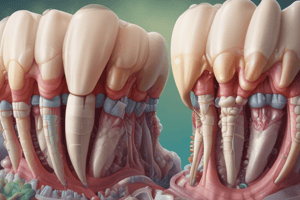Podcast
Questions and Answers
What cells attack microbes that breach epithelia and enter tissues or circulation?
What cells attack microbes that breach epithelia and enter tissues or circulation?
- Red blood cells and platelets
- T cells and B cells
- Neurons and astrocytes
- Phagocytes, natural killer cells, and plasma proteins (correct)
Which proteins attack microbes as part of the innate immune response?
Which proteins attack microbes as part of the innate immune response?
- Complement system proteins (correct)
- Antibodies
- Insulin
- Hemoglobin
How do innate immune responses affect adaptive immune responses?
How do innate immune responses affect adaptive immune responses?
- Enhance adaptive immune responses (correct)
- Delay adaptive immune responses
- Have no impact on adaptive immune responses
- Suppress adaptive immune responses
Which type of cells specifically recognize and react against microbes?
Which type of cells specifically recognize and react against microbes?
What is the main focus of the book 'Basic Immunology' by Abbas and Lichtman?
What is the main focus of the book 'Basic Immunology' by Abbas and Lichtman?
Which cells are involved in killing fungi according to the text?
Which cells are involved in killing fungi according to the text?
Which video is mentioned in the text for learning about innate and humoral immunity?
Which video is mentioned in the text for learning about innate and humoral immunity?
Which type of immunity relies on pre-existing mechanisms to combat pathogens?
Which type of immunity relies on pre-existing mechanisms to combat pathogens?
Which cells are responsible for enhancing adaptive immune responses against infectious agents?
Which cells are responsible for enhancing adaptive immune responses against infectious agents?
What are the primary players in the early response to pathogens?
What are the primary players in the early response to pathogens?
Study Notes
Introduction to Immunology
- Immunology studies the immune system's response to infections and tissue damage, playing a vital role in disease resistance.
- The immune system consists of cells, tissues, and molecules that work together to prevent and eradicate infections.
- Key immune responses include innate and adaptive immunity, which are critical for protecting individuals from infections.
Major Components of the Immune System
- Cells: Include lymphocytes such as B cells and T cells, along with Natural Killer (NK) cells, macrophages, and dendritic cells.
- Soluble Factors: Comprise antibodies, cytokines, and complement proteins which assist in immune responses.
- Innate Immunity: First line of defense involving non-specific responses including epithelial barriers, phagocytic cells, and inflammation.
- Adaptive Immunity: Tailored immune response that develops over time and involves B and T lymphocytes; more specialized than innate immunity.
Mechanisms of Humoral and Cellular Immunity
- Humoral Immunity: Mediated by B lymphocytes which produce antibodies targeting specific antigens.
- Cellular Immunity: Involves T cells, which can either assist in activating other immune cells (CD4 T cells) or directly kill infected cells (CD8 T cells).
Antigen Capture and Presentation
- Dendritic cells capture antigens and present them to T cells, initiating adaptive immune responses.
Properties of Adaptive Immunity
- Specificity: The immune system can distinguish between millions of different antigens.
- Diversity: Limited number of lymphocytes can respond to a vast array of antigens.
- Memory: Enhanced response to previously encountered pathogens; critical for vaccine effectiveness.
Immune System Organization
- Cells and tissues are organized to quickly locate and respond to pathogens, facilitating efficient immune responses.
Immunological Tolerance
- The immune system can coexist with self-antigens, avoiding harmful reactions to the body's own cells.
- Immune responses are self-limited, decreasing after the infection is resolved, allowing the system to reset.
Historical Contributions to Immunology
- Edward Jenner: Developed smallpox vaccination using cowpox, leading to disease eradication in 1979.
- Robert Koch: Demonstrated that infections are caused by specific microorganisms.
- Louis Pasteur: Pioneered vaccines for cholera and rabies.
- Paul Ehrlich: Investigated serum factors related to immunity transfer.
Innate Immunity Components
- Natural Killer Cells (NK cells): Attack and induce infected cells to self-destruct.
- Complement System: Series of plasma proteins that opsonize pathogens and induce inflammation, enhancing infection response.
Conclusion
- Innate immunity serves as the primary defense through various biological barriers, while adaptive immunity provides a specialized, long-lasting response to infections.
- The interplay between innate and adaptive immunity is crucial for maintaining health and preventing disease.
Studying That Suits You
Use AI to generate personalized quizzes and flashcards to suit your learning preferences.
Description
Test your knowledge on the major components of the immune system, including cells and soluble factors, innate and humoral immunity, antigen capture & presentation, mechanism of humoral immunity, and T-cell mediated immunity. This quiz covers key concepts in immunology as part of the Dental Microbiology and Immunology course.



